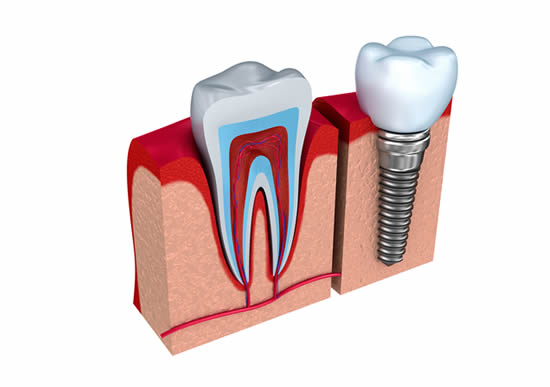Dental Implant Aftercare

How best to look after your new teeth implants?
Dentures have long been used to replace missing teeth, and aesthetically, they do a reasonable job. Some people seem to get on with them well enough, while others find that they become unstable and move around in the mouth which can make eating some foods quite tricky. This can sometimes cause people to restrict their diet to ‘easy to eat’ foods.
It isn’t surprising then, that a growing number of patients of the Cygnet Dental Practice opt to have dental implants placed instead. These currently provide the closest substitute for a natural tooth, replacing not only the crown part of the tooth, but the tooth root also. It is this latter factor that provides the excellent strength and stability that they are now well known for.
We have discussed how dental implants are placed in previous blogs, and today we would like to take a look at what you should do to help keep them healthy in the years following the treatment.
Initial stages
After you have had your implant placed, it is understandable that there may be some discomfort and you may need to use your preferred pain relief medication to relieve this. This discomfort will soon settle down though and you will be pain free again. This isn’t the only consideration in the initial post treatment period though. You will need to eat of course, but as the implants will not yet be fused with the bone, you will need to be very careful about what you eat for a short while until the osseointegration period is complete. As a reminder, this is the period when the new implant bonds with the natural jaw bone.
Initially, you should stick to liquid foods, such as soup. This might seem off putting, but a bit of planning ahead can make this more pleasant and this period only lasts for a short time; a small price to pay for having strong and secure teeth again.
As the bone begins to fuse with your new implant, you can start to add some soft foods to your diet. This might include things like mashed potatoes, well cooked pasta etc. It is really important that you exercise caution though as biting something hard with your implant at this stage could damage it. With a bit of patience though, after three months or so, you will be able to eat whatever you like and most likely things that you avoided if you previously wore dentures.
It is also important that you don’t smoke or drink heavily during this recovery phase as this increases the risk of periodontal disease which could threaten the implant.
After osseointegration (‘jawbone bonding’) is complete
When your implant is finally fused with the bone and the abutment and crown added, you can begin your new life with this excellent tooth replacement. This doesn’t mean that you can now ignore it though. Although it is made from man made materials, and therefore not prone to decay etc, you do need to clean your implant and the area around it. The reason for this is that gum disease can affect the bone in which it is held, and, if this starts to deteriorate, the implant can work loose and may even fail altogether.
The good news is that looking after your fully integrated implant really isn’t that hard to do and doesn’t really involve anything other than what you should be doing with your natural teeth anyway.
It is important that you brush well around the implant, using a healthy toothbrush that is no more than three months old. You should also use dental floss to help remove any food particles or bacteria that has collected around the gums. Finally, you should arrange to have an appointment with the hygienist at our Wickford dentist at least every six months, and more frequently if they recommend that you do so. If you do this, there is every chance that your new dental implant will last you for a very long time; possibly in excess of twenty years.
And if you don’t?
What could go wrong if you don’t clean your implant and surrounding tissue sufficiently?
The fact is that poor quality cleaning and neglect could lead to not only well known symptoms of gum disease, such as bleeding gums and bad breath, but could become more advanced and infect the bone structure supporting the new implant. As this degrades, the implant is likely to become insecure and may even fall out altogether. Similarly, a disease known as peri-implantitis can have a similar effect. This affects the gum tissue which can cause it to become swollen and may detach from the implant, creating pockets where further infection can take place and cause even more problems.
As you can see then, having a tooth implant procedure at our Wickford dental clinic is just the first part of the process. We will support you and monitor the health of the new implant during its post placement period but its health does also depend on you taking responsibility for it too. We will provide you with any necessary aftercare advice following your treatment and we are always available to answer any questions or address any concerns that you might have.
If you have any questions about dental implants or would like to arrange an initial consultation with a dentist to discuss your suitability for them, please contact the Cygnet Dental Practice by calling us on 01268 733078.
